Discovering Home
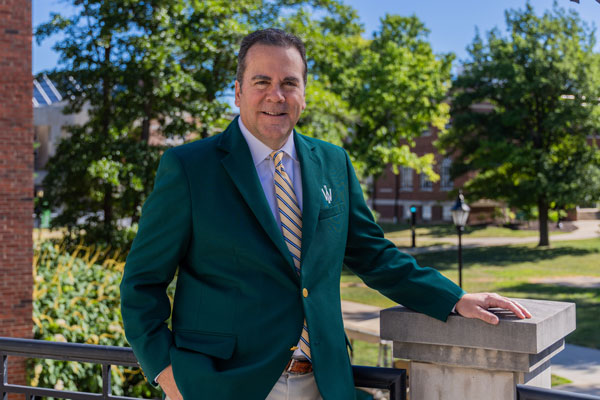
Story by Chris Francis '13
On July 1, 2024, Sheahon Zenger, or Dr. Z as many call him, succeeded S. Georgia Nugent as the 21st president of Illinois Wesleyan University.
In a speech delivered by Zenger after his announcement as president-elect, he described the experience of joining IWU’s administration as “coming home.” He reflected this sentiment, and an entire career of insight into higher education, in an interview with the Illinois Wesleyan University Magazine.
“This is the type of university I should have gone to but didn't have the opportunity to,” he said while marveling at the circular Bates & Merwin Reading Room on the fourth floor of The Ames Library.
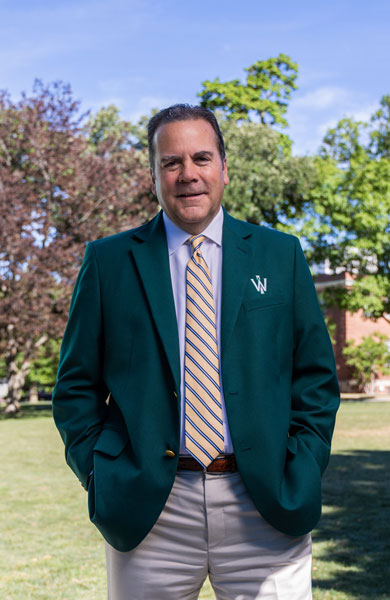
“I jokingly tell people I was being recruited to attend Washington University in Saint Louis,” Zenger said of his high school self, growing up in Hays, Kansas. “I knew that, academically, I could go anywhere… But after my brother passed away when I was a senior in high school, my parents said, ‘you know, if you don’t know where to go, you could stay here for a year,’” where his parents were professors at Fort Hays State University. Zenger began his college career at Fort Hays that year.
“I feel like I've spent the last 40 years trying to get to Illinois Wesleyan. And finally I’m here.”
· · ·
"Sheahon's track record of strategic leadership, relationship building and successful fundraising makes him an ideal leader to guide Illinois Wesleyan as we build on our traditional strengths to innovate and ensure our vitality in the future," said Timothy Szerlong ’74, chair of the IWU Board of Trustees, in the announcement of Zenger’s appointment.
"The search committee worked incredibly hard to make sure we found the right president for Illinois Wesleyan at this time," said W. Thomas Lawrence '80, vice chair of the IWU Board of Trustees and chair of the presidential search committee. "Sheahon's background in higher education, his passion for the liberal arts, and his love of Bloomington-Normal and Illinois Wesleyan University made our decision incredibly easy."
Zenger has more than 30 years of experience in higher education leadership. He first came to Bloomington-Normal as Illinois State University’s director of athletics in 2005 before taking a similar position at the University of Kansas, where he previously received his doctorate in educational policy and leadership. He comes to IWU after serving for two years as interim president of the University of New Haven in West Haven, Connecticut, where he was also executive vice president and chief operating officer.
Across his career, he has raised nearly $400 million to support capital projects and strategic initiatives, with demonstrated success in building relationships with private donors. And, throughout his career in higher education, Zenger has prioritized inclusion and equity. He has created or led multiple diversity programs, and he initiated a gender equity review while at ISU.
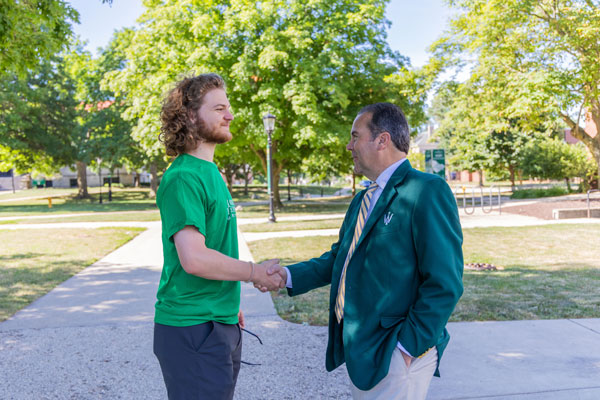
At the University of New Haven, Zenger created new opportunities for collaboration and partnership with city and state governments, launched a new brand campaign aimed at increasing visibility and enrollment for the university and initiated comprehensive student recruitment efforts. His efforts contributed to two of the largest incoming classes in the university’s history in the past two years. He also collaborated on the launch of eight new degree and certificate programs, with active involvement in faculty development initiatives.
· · ·
While his career has been in university administration, Zenger relishes the world of academia itself, as well as opportunities to teach using his degrees in English, journalism and education.
“When I give a guest lecture, I get pulled into all kinds of classrooms, whether it be business, sports management, English, journalism,” Zenger said. “I became a bit of what my parents wanted for me, to be something of a pragmatist and universalist in my studies — a jack of all trades — which has worked well for me. Though I ended up rebelling against them a bit, like kids do.
“I was honored to be the only other person that Ray Hiner (professor of history at the University of Kansas) would let behind his podium,” Zenger said. Zenger studied closely with Hiner as a graduate student given that, as a 19th century American history buff and education philosopher, Zenger was especially interested in Hiner’s field of study: the history of childhood in America. “It’s something I’ve been drawn to learn and understand from the Puritan age to the baby boom.”
Turning toward pragmatism, the intersection of historical inquiry and the challenges of preparing a new generation for life and career ignites Zenger’s interest.
“We have to understand what each generation has thought of higher education and what it means to have a career,” he said. “It's our job to communicate that, if you'll come here and pursue the liberal arts’ concept of mind, body and spirit and cultivate them the way they should be cultivated, then you will get the right job. It's our job and my job, first and foremost, to tell that story.”
Zenger is brimming with ideas about the future of higher education and what IWU’s legacy can become, but he is intentionally and modestly reserved about speaking his opinions.
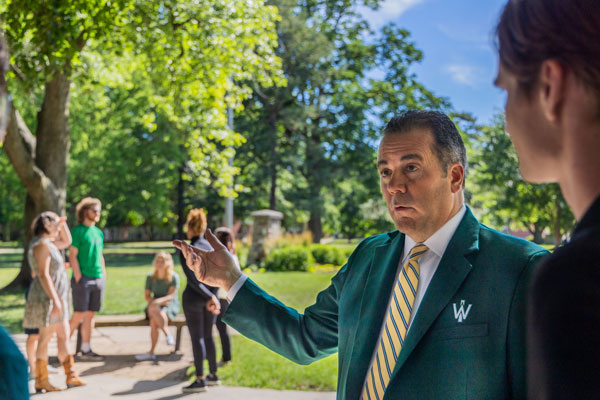
“This is something I believe fundamentally with every leadership role I’ve taken since 2005: Until I sit down with my team, faculty, staff, students and alumni to listen to them, it would be arrogant of me, and I'll repeat, it is arrogant to say, ‘We’re going to do this, this and this,’ when I don’t yet know what I don’t know,” he said. “I don't have all the answers. I have, I believe, a common mission with the institution, and an excitement about being here. But wherever we go will be a team effort built on collaboration.”
At the center of that collaboration is the IWU faculty.
“To me, my role here is to help the faculty,” he said. “I want them to be able to find the joy that they've always had, and hopefully never lost, for their field of study. And I'd like for them not to have to worry about the revenue stream. The job of the administration is to assist the faculty so that they can be who they are in the classroom, so we can attract the student base that we need to to fulfill the mission of the university. My goal is to provide students at Illinois Wesleyan with the best college experience possible.”
If there is a guiding lesson Zenger has learned in his career and wishes to bring to his presidency, it is that of a kind and driven Midwestern work ethic.
“Each of my mentors brought different things to the table,” he said. “Bill Snyder, the football coach at Kansas State; Al Bowman, president of Illinois State; Victor Boschini, the chancellor at Texas Christian University; Bernadette Gray-Little, the 17th chancellor at the University of Kansas, and Del Shankel, the 15th chancellor at the University of Kansas. I hate to leave anyone out, but with each mentor there are things you want to emulate and things you want to do differently. From all of them, I take the work ethic of being kind and being generous in making a team effort.”
· · ·
Zenger realizes that his career gives an impression of him as living in and coming from the world of athletics. He obviously loves sports, but “I’ve always been a better student than athlete,” he said.
“I was a kid that would read, then go outside and shoot baskets, then go back in and read some more,” Zenger said. “My mom would take me to the library about once every other week, the public library or the university library, and she would always get frustrated because I would check out eight to 10 books all on the same topic. One month it might be Native Americans. Next month it might be a sport. A lot of it had to do with history and historical fiction. That has always been my favorite. I go through reams of material like that.”
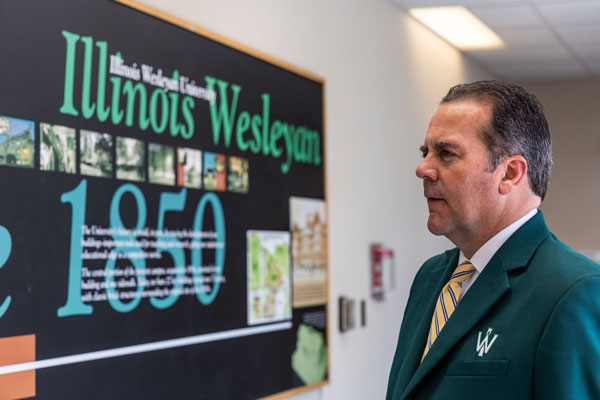
To Zenger, there is no tension in loving academia and sports. In talking about both, Zenger arrives at similar lessons in the heart of both history and athletics, and in the North American West and Midwest.
“One book that I recommend to everyone is The Four Agreements by Don Miguel Ruiz, a gentleman who comes from the Toltec nation. It shares the Toltecs’ four tenets: be impeccable with your word, don’t take things personally, don’t make assumptions, and just work hard at what you do. What I like to add is to also be humble, because out of humility comes gratitude and quiet confidence.”
“That’s what being on a team is about,” he adds. “It’s not about me, it’s not about you, it’s about us. Illinois Wesleyan always needs to come first. If it doesn’t, then we need to reevaluate our priorities.”
· · ·
While Zenger appreciated his time on the East Coast with the University of New Haven, his heart has always been in the Midwest. “I longed to be back with my people,” he said of returning to Bloomington-Normal.
That longing includes a desire to be among the people, buildings and atmosphere that make Illinois Wesleyan what he calls a classic example of what a liberal arts college should be, and that make him think about the “what ifs” of both the past and future.
While at ISU, Zenger admired IWU. “I would at times stop by campus to go for a walk on the quad and just sit and rest,” he said. “I found it so satisfying that there are places like this that I wasn’t able to find as an undergraduate.”
Now as president of the University, he has found that home.